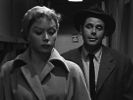Eye For Film >> Movies >> Human Desire (1954) Film Review

Carl Buckley (Broderick Crawford) has lost his job - a result of losing his temper with the boss. Now he's in trouble. So he turns to wife Vicki (Gloria Grahame) for help. He doesn't want her working - that would offend his masculine sensibilities. Instead he wants her to go and visit an influential man who liked her when she was a girl, to pull some strings on his behalf.
It's the one time we see Vicki unguarded; she's looking out of the window, not performing for anyone. From the way she stiffens, the shadow that passes across her face, it's clear what liked means, no matter what may have happened afterwards. When she gets home not wanting to be touched, anxious to shower, anyone can see the price she has paid for her husband's sake - yet to him, the picture looks different. Convinced that she has wilfully betrayed him, he beats her, threatens to kill her, then forces her to do what he wants.

Plus ça change, plus c'est la même chose. This is film noir, however, so what Carl does next makes the situation even darker. And what Vicki does is to throw herself into the arms of another man - Glenn Ford's Jeff, an engine driver recently returned for the army - hoping that he will solve all her problems for her. Ought she instead to go to the police? Perhaps, but this was in an era when women complaining of domestic abuse could expect little help from any authority, and when rape within marriage wasn't even recognised as a crime. Should she have taken other action? Almost certainly, but she's a cowed thing, somebody who has been taught all her life that she must depend on men, despite apparently never having met one who was dependable.
Will things be different with Jeff? We see him attract criticism for getting involved with a married woman, yet he's largely portrayed as sympathetic. Indeed, we see him partly through the eyes of his landlord's daughter, who has a crush on him; she's much younger than him, as Vicki is much younger than Carl, which adds an extra layer of shadow to the film as she is clearly Jeff's alternative love interest. If he switched his affections to her, would they just end up the same way, she becoming trapped before she realised her potential for independence, he becoming racked by jealousy? This dimension to the film was ignored by marketing materials which presented her as a good girl and Vicki as a woman 'born to be bad', but what director Fritz Lang actually presents us with is much more nuanced - and in noir, those shades of grey really matter.
It's billed as an adaptation of Émile Zola's novel La Bête Humaine, but this is true only in the loosest sense, and it has much more in common with Jean Renoir's adaptation thereof - with the sex and violence muted and some of the character work simplified to cater to American mores. Although this makes it considerably less graphic than some of Lang's earlier work, it still has his stamp on it. His fondness for straight lines and elongated beams of light, the way he focuses on Grahame's upturned face, the way he communicates murder without ever showing us the body - just an image of a knife in a man's hand - brought something of the language of German expressionism into US cinemas. As Vicki and Jeff in turn find themselves seemingly trapped, with limited control over their own destinies, this darkness from another place eats away at viewers' belief in the possibility of redemption.
Though not one of Lang's best works, ultimately sticking a little too close to the standard outline of thrillers of the period, this is nevertheless a satisfying experience for genre fans. Buried under the familiar interaction of femmes fatales, unwary nice guys and human beasts are questions about free will and original sin. The endless rattle of the train tracks reminds us that this is only one of many such places, many such stories. There's a world out there that promises escape but it's a world full of people, just the same.
Reviewed on: 16 Feb 2019


















